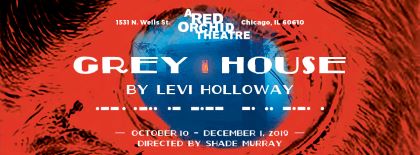
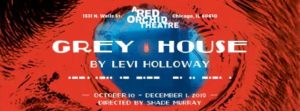 [rating=2]True to its horror genre, “Grey House” did not disappoint, especially when it came to the quality of the acting. There were many moments when I found myself swept up by this dysfunctional family and wondering how they might have treated me (as an outsider) had my own car broken down on a country road by their cabin. As with the movie “Misery”, the script can genuinely boast of brutality and gruesomeness. But there are moments when I should have felt more miserable.
[rating=2]True to its horror genre, “Grey House” did not disappoint, especially when it came to the quality of the acting. There were many moments when I found myself swept up by this dysfunctional family and wondering how they might have treated me (as an outsider) had my own car broken down on a country road by their cabin. As with the movie “Misery”, the script can genuinely boast of brutality and gruesomeness. But there are moments when I should have felt more miserable.
What begins as a journey to clean out a deceased father’s house ends as a nightmare when a couple survives a crash with a deer during a once-in-a-100-year blizzard. The husband Henry (Travis A. Knight) makes his way on a broken leg as he and his wife Max (Sadieh Rifai) seek help at a mountain home, occupied by a very unusual Oregon family. Their members are made up of the mother Raleigh (Kirsten Fitzgerald), her grandson (Charlie Herman), and her four daughters. Squirrel (Autumn Hlava) is probably the strangest of the girls, with her knocking on walls in Morse code. Is she a wounded animal that has become human? The most unusual encounters occur with Marlow (Sara Cartwright), who is the coldest and most clinical of the group. Sixteen-year-old A1656 (Haley Bolithon) seems to be the most approachable but odd in her own way. Then there is Bernie (Kayla Casiano), who is deaf; everybody uses American Sign Language (ASL) to communicate with her. Despite clear differences in their use and understanding of the English language, the four daughters all seem to have a mysterious type of telecommunication among themselves, particularly when it comes to furthering their evil ends. The final character in the play is the Ancient (played by Dado), who resembles the ghost of the killed deer from the earlier car accident and simultaneously represents the horned devil, paving the path to eternal slumber. She has a special relationship with Henry during his unconscious moments, as he suffers through his painful injury.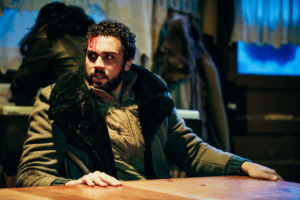
“Grey House” plays on our worst fears of what can happen when meeting people who do not mean well for us and treat us like objects. Not only might they attack us physically but they might multiply our trauma exponentially by playing psychological games, in this instance, turning us into our own worst enemy. The cleverest part of the show is the “Hide and Go Freak” or should I say the “Show and Hell,” a clever take on “Show and Tell” combined with “Truth or Dare.” Do we really know those who are closest to us, and what they are capable of doing? Are we fully aware of what good or evil they may have already done in their lives—or what thoughts they may harbor against us? What secrets do each of us hold that we don’t want other people to know about?
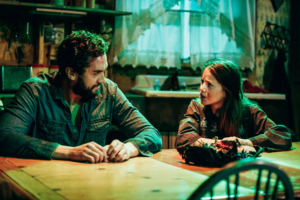 The overriding horror in this play has to do with the fact that each of us has a dark side that we may not want to reveal but which definitely does exist. The family understands this almost too well: that hiding this aspect of our personality can make people two-faced and less than honest. Yet they too harbor certain truths about themselves that they are unwilling to admit to others. At the same time, the family members believe that each and every one of us is at a given place at a given point in time for a specific reason that we may not fully recognize. The belief that destiny strictly governs our lives is thus an unspoken reality for them. What this means is that in the case of the lost couple, it was as if they had preplanned their calamitous adventure with the intention of becoming stranded in the first place—complete with the dire consequences that follow. In a world without free will, a bad end thus becomes nobody’s fault.
The overriding horror in this play has to do with the fact that each of us has a dark side that we may not want to reveal but which definitely does exist. The family understands this almost too well: that hiding this aspect of our personality can make people two-faced and less than honest. Yet they too harbor certain truths about themselves that they are unwilling to admit to others. At the same time, the family members believe that each and every one of us is at a given place at a given point in time for a specific reason that we may not fully recognize. The belief that destiny strictly governs our lives is thus an unspoken reality for them. What this means is that in the case of the lost couple, it was as if they had preplanned their calamitous adventure with the intention of becoming stranded in the first place—complete with the dire consequences that follow. In a world without free will, a bad end thus becomes nobody’s fault.
“It doesn’t turn out well,” says Henry rightly towards the beginning, as he foreshadows the action. But this statement also foreshadows an uncomfortable unevenness in the plot and a lack of momentum in the way the story develops. The action should have built to a fevered pitch and stirred up more emotions throughout. Though the outlandish (and often unexpected) habits and behaviors of these hill people draw us into their lives, there is a complacency in the horror throughout much of the show. I am reminded of a line from the satirical novelist Thomas Berger who once wrote (in a very different context), “It was Kafka who taught me that at any moment banality might turn sinister, for existence was not meant to be unfailingly genial.” That moment does occur in the script—unfortunately, way too many times; that is, whenever certain dark and eerie suspicions that the audience holds become realized or abandoned. Although there were times when I was horrified during the performance (mostly a good thing for a horror story), I never felt that I was on the edge of my seat as I waited for the proverbial shoe to drop.
At the very end, I had to resist the urge to figure everything out; because there are some aspects of the story that just don’t add up—or if they do, they are too bizarre. While some things are somewhat predictable, other parts seem like a 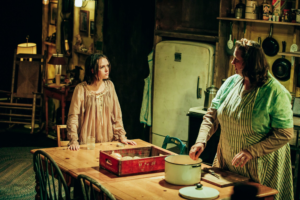 weird mishmash, either designed to gross out the audience or tie up loose ends strangely. Approaching the tale with mindlessness and letting the lurid details overtake you might be a good strategy if your goal is simply to enjoy the show.
weird mishmash, either designed to gross out the audience or tie up loose ends strangely. Approaching the tale with mindlessness and letting the lurid details overtake you might be a good strategy if your goal is simply to enjoy the show.
“Grey House” thus represents the gray area of the subconscious, where the light side of what it means to be human meets up with the dark places buried deep within the soul. And don’t think that evil and bloodthirstiness aren’t primordial: They exist in this world, rotted (I mean rooted) in the terror and fear that the subconscious mind is more than capable of producing.
Kurtis Boetcher’s scenic design is done very well as is props design by the director Shade Murray, who does a fantastic job with the various knives, hatchets, and torture devices used on stage. The Rot Shop and their key artists Brent McCrea, JB Prater, Ryan Oliver, and David Wimsatt, have designed some great special effects including the prosthetics.
I enjoyed the vocal numbers. The women’s voices are charming and the song lyrics are excellent. Credit needs to be given to Jeffrey Levin, the sound designer and music arranger, and to Elenna Sindler, the music director.
The part I liked most has to do with, what I call, “the magic refrigerator.” At one moment, it is filled with potables and tinctures, at another moment with eggs and bacon, and at yet another moment with dinner fixings and even a round red ball. I wish my refrigerator could anticipate my needs so well, with various items disappearing and reappearing as I need them! By coincidence, my original plan for the day was to clean out and wash my refrigerator. So every time an actor opened the fridge on stage or pulled something out, I kept thinking about how this important task awaited me at home.
On this particular Saturday afternoon, the leaves were turning and nearly at their peak. The sunny skies had the most intriguing clusters of clouds. People on Wells Street were busily crowding the outdoor restaurants and lingering at their tables to squeeze out the last of 70-degree summer weather. Due to my last-minute change in plans, I got to enjoy this perfect fall day, take a lovely drive, and watch this unusual performance instead of heating up pans of boiling water with sponges in hand. That said, sometimes it’s best to stay home and scrub down the refrigerator and all the dark and musty places within. Who knows what lurks behind the cottage cheese? It might be Louis or Albert—or even Uncle Charlie—nestled alongside the moldy green beans.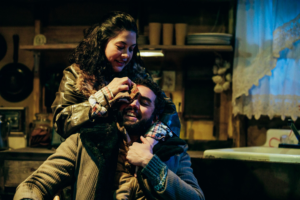
“Grey House” by Levi Holloway is playing from October 20, 2019 through December 1, 2019, at A Red Orchid Theatre, 1531 N. Wells Street, Chicago.
Thursdays and Fridays – 7:30 p.m.
Saturdays – 3:00 and 7:30 p.m.
Sundays – 3:00 p.m.
Tickets:
$30 – Thursdays
$35 – Friday and Saturday Matinee
$40 – Saturday Evening and Sunday Matinee
To purchase tickets, contact the box office at 1531 N. Wells Street, Chicago, or at 312-943-8722, or online at http://www.aredorhidtheatre.org
Parking on Wells Street can be touch, so as always give yourself some time and perhaps use public transportation.
To see what others are saying, visit www.theatreinchicago.com, go to Review Round-Up and click at “Grey House”.

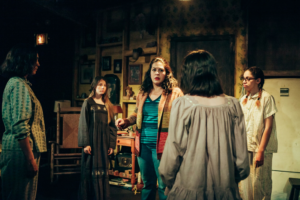





More Stories
“Survivors” reviewed by Julia W. Rath
“Prayer for the French Republic” reviewed by Julia W. Rath ( and another by Paul Lisnek)
“Obliteration” reviewed by Mark Reinecke